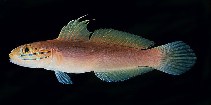| Family: |
Gobiidae (Gobies), subfamily: Gobiinae |
| Max. size: |
6.9 cm SL (male/unsexed) |
| Environment: |
demersal; marine; depth range 12 - 35 m |
| Distribution: |
Western Pacific: Okinawa, Japan and the Philippines. |
| Diagnosis: |
Dorsal spines (total): 6-7; Dorsal soft rays (total): 14-15; Anal spines: 1-1; Anal soft rays: 14-15. Characterized by pale grey body color with yellowish snout; 2-3 blue stripes on cheek; dorsal fin with yellow filaments; adult male has black throat and mouth; second to fourth dorsal spines produced into prolonged filaments in adult; rhomboid caudal fin; caudal length 2.8-3.4 in SL; longitudinal scale series 76-81; ctenoid body scales except cycloid on abdomen; head or midline of nape without scales; cycloid scales extending forward on side of nape to above middle of operculum in adult; scaled pectoral fin base and prepelvic area; depth of body 4.7-5.1 in SL (Ref. 90102). |
| Biology: |
Occurs in areas with rubble, rock and sand bottoms of coastal reefs in 12-35 m. Solitary or in pairs (Ref. 90102). Feeds on small invertebrates particularly copepods. |
| IUCN Red List Status: |
Least Concern (LC); Date assessed: 27 August 2020 Ref. (130435)
|
| Threat to humans: |
harmless |
Source and more info: www.fishbase.org. For personal, classroom, and other internal use only. Not for publication.

